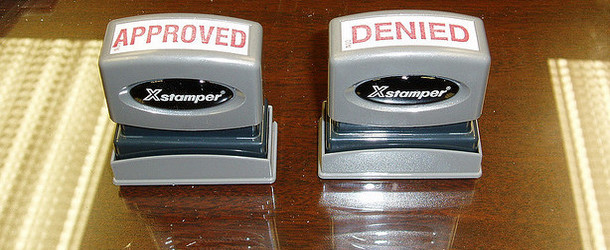Here’s some Q&A with regard to the home loan approval process: “What do underwriters do?”
Once you actually apply for a home loan, your mortgage application will be organized by a loan processor and then sent along to a loan underwriter, who will determine if you qualify for a mortgage.
The underwriter can be your best friend or your worst enemy, so it’s important to put your best foot forward.
The expression, “you’ve only got one chance to make a first impression” comes to mind here.
Trust me, you’ll want to get it right the first time to avoid going down the bureaucratic rabbit hole.
The Underwriter Will Approve, Suspend, or Decline Your Mortgage Application
- After you formally apply for a home loan your file will be submitted to the underwriting department
- A human underwriter will then review your loan application and decision it
- Their job is to approve, suspend, or decline your application based on its contents
- It’s paramount to submit a clean file to boost your chances of loan approval
Simply put, the loan underwriter’s job is to approve, suspend, or decline your mortgage application.
If the loan is approved, you’ll receive a list of “conditions” which must be met before you receive your loan documents. So in essence, it’s really a conditional loan approval.
If the loan is suspended, you’ll need to supply additional information or loan documentation to move it to approved conditional status.
If the loan is declined, you’ll more than likely need to apply elsewhere with another bank or mortgage lender, or take steps to fix whatever went wrong.
The Three C’s of Mortgage Underwriting
- Credit – payment behavior over time (your credit report)
- Capacity – ability to repay the home loan (your income and assets)
- Collateral – value of the underlying asset (the property)
Now you may be wondering how underwriters determine the outcome of your mortgage application?
Well, there are the “three C’s of underwriting,” otherwise known as credit reputation, capacity, and collateral.
Credit reputation has to do with your credit history, including past foreclosures, bankruptcies, judgments, and basically measures your willingness to pay your debts.
[What credit score do I need to get a mortgage?]
If you’ve had previous mortgage delinquencies or even non-housing related delinquencies, these will need to be taken into account.
Typically these items will be reflected in your three-digit credit score, which can actually eliminate you from contention without any further underwriting necessary if you fall below a certain threshold.
For example, you need a 620 FICO for a conforming loan and at least a 500 score for an FHA loan.
Your history supporting significant amounts of debt is also important; if the most you’ve ever financed has been a plasma TV, the underwriter may think twice about approving your six-figure loan application.
Capacity deals with a borrower’s ability to repay a loan, using things like debt-to-income ratio, employment history, salary, cash reserves, loan program and more.
In short, the underwriter wants to know that you can pay back the mortgage you’re applying for before granting approval.
[How much house can I afford?]
Finally, collateral involves the borrower’s down payment, loan-to-value ratio, property type, and property use, as the lender will be stuck with the home if the borrower fails to make timely mortgage payments.
A home appraisal will be ordered to determine the value of the property using an independent appraiser.
Mortgage Underwriters Consider Layered Risk
- They don’t just look at one aspect of your borrower profile in a vacuum
- They consider all factors together to make a sound underwriting decision
- Those with risk in one area who are able to compensate for it may be approved
- While those with issues in all areas might be denied due to layered risk
Now it’s important to understand that the three C’s are not independent of one another.
All three must be considered simultaneously to understand the level of “layered risk” that could be present in said loan application.
For example, if the borrower has a less-than-stellar credit score, limited asset reserves, and a minimal down payment, the risk layering could be deemed excessive, leading to denial.
Consider a home buyer with zero down payment, a 600 FICO score, and only $1,000 in the bank, who just started a new job.
Conversely, consider a home buyer putting down 20%, with a 760 FICO score and $50,000 in cash reserves, who has worked the same job for a decade.
Obviously the second borrower sounds like a much better candidate for a mortgage.
This is the underwriter’s discretion, and can certainly be subjective based on other factors such as their occupation, how long the borrower has been in the line of work, why the credit score is less than perfect, and so on.
The underwriter must decide, based on all the criteria, if the borrower is an acceptable risk for the mortgage lender, and if the end product can be resold without difficulty to investors.
Layered risk is a major reason why the mortgage crisis got so out of hand.
Countless borrowers applied for mortgages with stated income and zero down financing, which is certainly very high risk, and were easily approved.
Rising home prices covered up the mess for a while, but it didn’t take long for everything to unravel. This is why sound mortgage underwriting is so critical to a healthy housing market.
What Shouldn’t You Do During Underwriting?
One last thing. When the underwriter is working to decision your loan file, you as the borrower should do your part as well.
This means NOT applying for new lines of credit, such as a credit card or a new auto loan. And not making large purchases.
If you do, they could show up on the credit report or be reflected in your credit scores. The last thing you want is a lower credit score to jeopardize your loan application.
The same goes for moving assets around from one bank account to another, or switching jobs. It might sound crazy, but just about anything you can think of has happened.
Long story short, you want to remain in a holding pattern while your loan goes through underwriting and ideally gets funded.
Once the loan is funded and recorded, you can go on about your business, whether it’s buying new furniture or applying for a new credit card.
But until that time, you can make life easier for everyone (including yourself) by doing nothing!
Mortgage Underwriter FAQ
Do underwriters work for the bank/lender?
Yes, underwriters are employees of banks, lenders, and mortgage bankers. They work on the operational side of things, making loan decisions after the sales team brings the loan in the door. This means they work in the same building as the sales team.
How long does underwriting take?
It might only take an underwriter a few hours to comb through a loan file and approve, suspend, or deny it. However, mortgage lenders only have so many underwriters available, and surely the number of loans in the pipeline will exceed the number of staff. As such, much of the time might be waiting in the queue until a pair of eyeballs actually look over your loan.
So if you’re wondering how quickly can underwriting be done, it may depend on how busy the company is and if there’s any backlog. Once your file does get in front of an underwriter, the average time for underwriting is pretty quick, often 24 hours or less.
Why do underwriters take so long?
Hmm…I don’t know, because they’re approving a six-figure loan amount, or seven, to a complete stranger. As noted, the actual underwriting might not take that long, but the amount of available underwriters (humans) might be low. So you could just be in the queue. A clean loan file will get approved faster and with fewer conditions so get it right before the underwriter even sees it.
Do underwriters verify employment?
While employment is generally verified nowadays when you take out a mortgage, it might not be the underwriter verifying it. Instead, the loan processor may obtain the verification of employment (VOE). Many use the “The Work Number,” an independent third-party employment verification company now owned by credit bureau Equifax.
How much do loan underwriters make?
They can make pretty good money. Salaries may be in the high five figures to low six figures if they’re seasoned and skilled in underwriting all types of loans, including FHA, VA, and so on. If you start as a junior underwriter the salary could be less than $50,000. But once you become a senior loan underwriter, the pay can jump up tremendously. It may also be possible to earn overtime.
Do underwriters make commission?
They shouldn’t because that would be a conflict of interest. They should approve/deny loans based on the characteristics of the loan file, not because they need to hit a certain number. Compensating them for loan quality might be a different story, but again could lead to discrimination if they cherrypick only the best loans.
Do underwriters work weekends?
I’ve heard of some that have. I don’t know if they do on a regular basis, but if loan volume picks up in a short period of time it’s possible to come in on a Saturday or Sunday. The mortgage world is all about highs and lows, so sometimes it might be slow and other times it’s impossible to keep up.
Are underwriters warm and friendly?
They can be if you don’t rub them the wrong way. I look at mortgages kind of like the DMV. Show up with the right paperwork and a good attitude and you’ll get in and out before you know it. Do the opposite at your peril!
(photo: Joelk75)
Publisher: Source link











